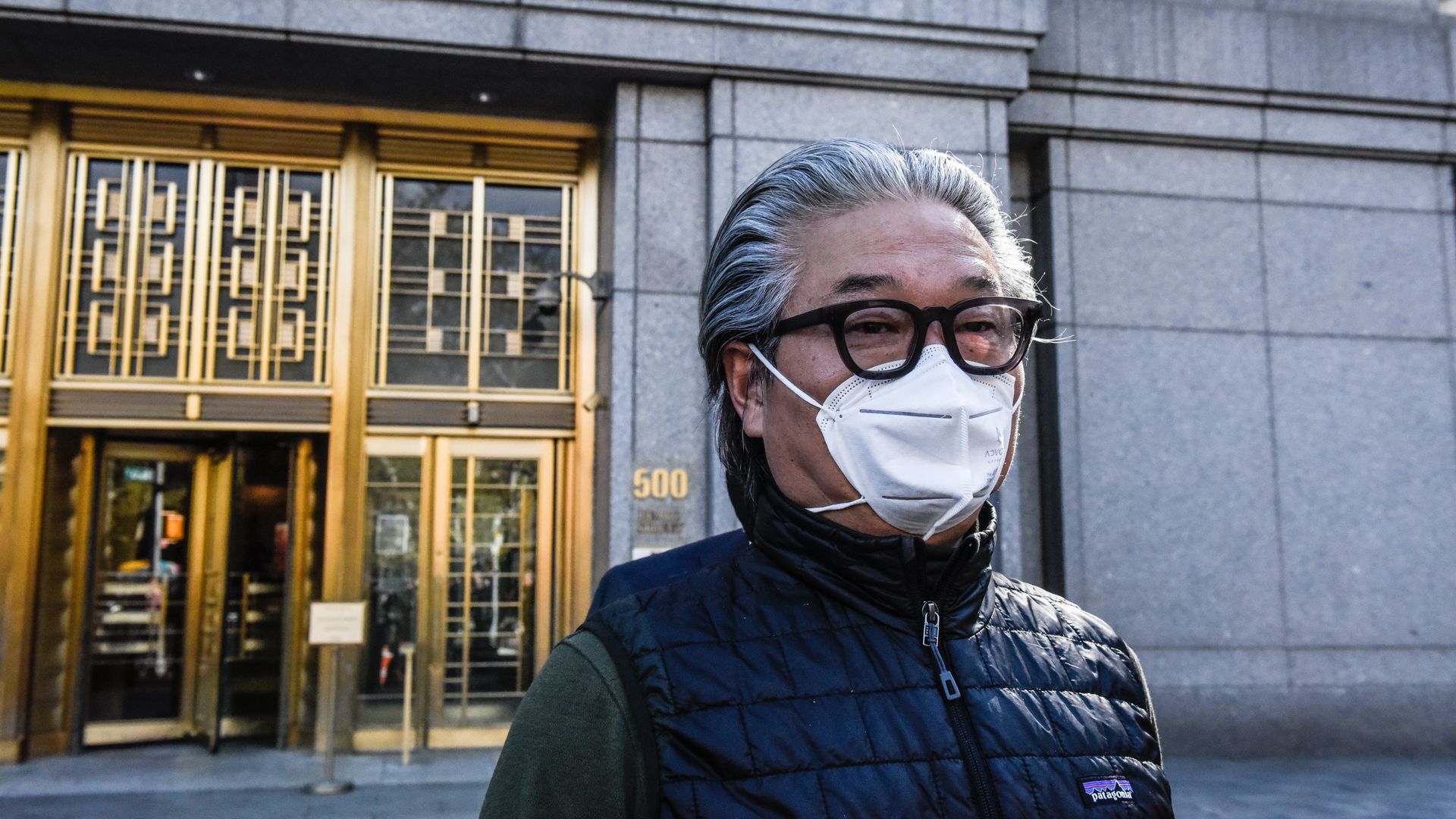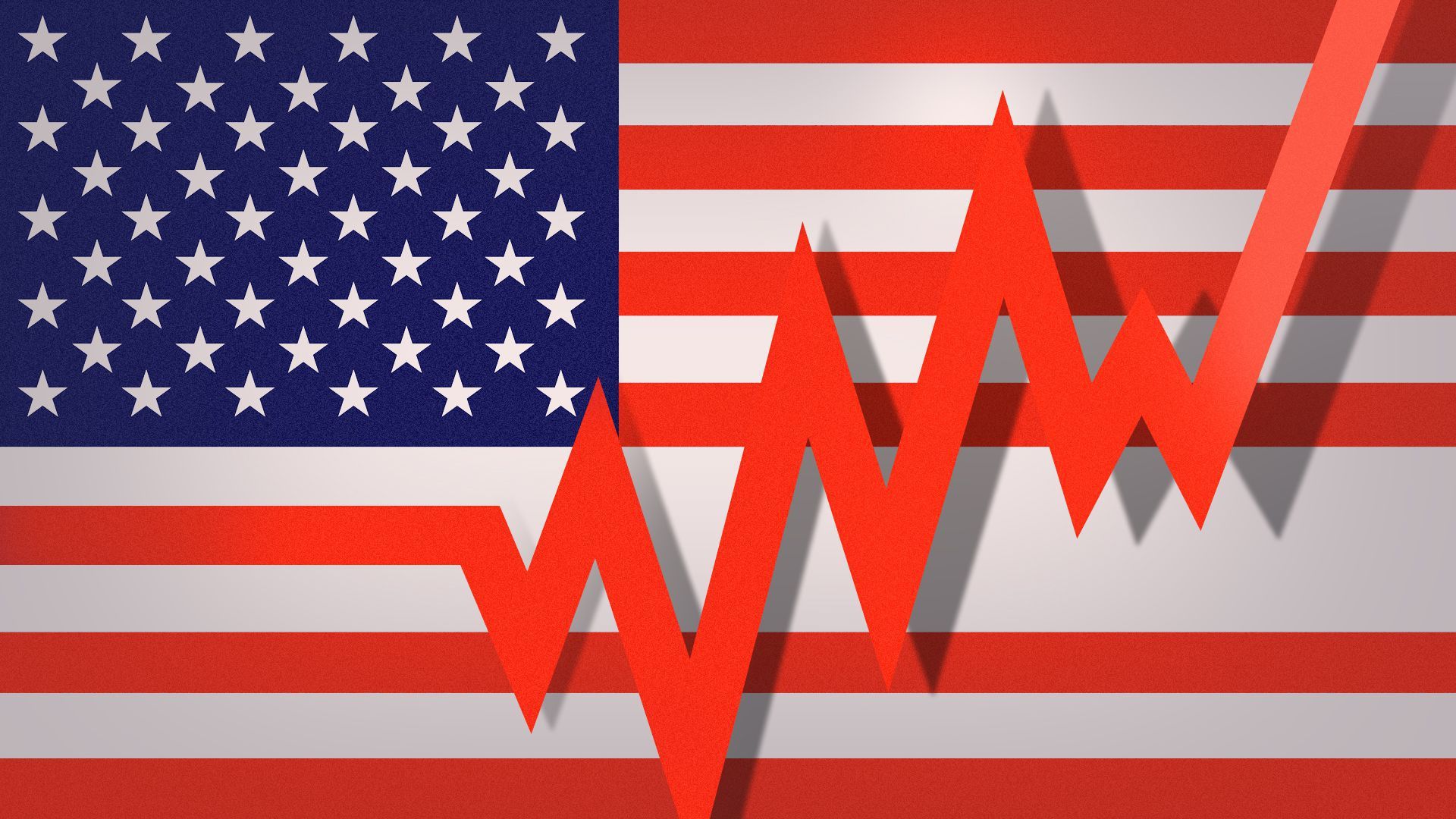| | | | | | | Presented By Mint | | | | Axios Markets | | By Matt Phillips and Emily Peck · Apr 28, 2022 | | 🐓 Good morning. Today we'll take a look at the criminal and civil charges Uncle Sam just dropped on Bill Hwang, the former hedge fund manager whose family office imploded spectacularly, leaving much of Wall Street holding the bag. We'll also delve into two of the fiercest inflationary forces currently buffeting consumers, and take a time machine back to 1982. Today's newsletter, edited by Kate Marino, is 1,067 words, 4 minutes. | | | | | | 1 big thing: What they say Bill Hwang did |  | | | Bill Hwang departs federal court in New York on April 27, 2022. Photo: Stephanie Keith/Getty Images | | | | Bill Hwang's indictment on Wednesday alleges a remarkably simple route to defrauding some of the world's most sophisticated financial institutions. It says he and his family office, Archegos, simply lied to them, Matt writes. Driving the news: In a criminal indictment and a civil complaint, Federal authorities said that Hwang and his associates used Archegos as "an instrument of market manipulation and fraud" — and offered new details on how, they allege, the firm fraudulently convinced major Wall Street banks to extend Archegos billions of dollars worth of credit. Why it matters: If you're trying to understand how Wall Street works, never let an epic screw-up go to waste. When something goes wrong, and, even better, criminal indictments arrive — that's when you get to see how things actually work. - As screw-ups go, the March 2021 implosion of the hedge fund-like Archegos was one for the ages, eventually costing banks like Morgan Stanley, Nomura and Credit Suisse billions of dollars.
The government alleges Hwang and a former lieutenant (who were arrested Wednesday) manipulated prices in publicly traded stocks. The intrigue: Hwang didn't always buy shares of stock. Instead, he was often buying a product from a bank, called an equity "swap," which is a contract with payouts tied to stock movements. When you buy such a swap, which is totally legal, you get the benefits of owning a stock — the exposure to its movements — without having to really own it. So what's the problem? Well, as I read it, it essentially comes down to lying. - At some point, banks that sold swaps to Hwang — and extended him large amounts of credit — noticed he was making remarkably large bets. This generated loads of fees for them — but also put them at risk. If Hwang's bets went against him, he could wind up owing them large amounts of money he didn't have.
The banks started asking questions along the lines of "By the way, are these the only crazy bets you're making? You're not doing this with anybody else... right??" - The government alleges that throughout 2020 and into 2021 Archegos' responses to such questions were often "deceptive, false and misleading."
- Such statements, the government says, amount to violations of anti-fraud provisions of securities and commodities trading laws.
The bottom line: I'm not a lawyer and have no idea how this case will play — or plead — out. But it's interesting to see the banks portrayed as the victims in the saga, especially since several of them saw red flags around Archegos that made them nervous — but they stuck with him all the way down. - It's hard to say why, but I'll bet the fees they pocketed from the massive amounts of business he did on Wall Street likely had something to do with it.
Read the full story. |     | | | | | | 2. Catch up quick | | 📉 Global bonds are set for their worst month on record. (Bloomberg) 🏠 Crypto-backed mortgages with no down payments are now a thing. (Bloomberg) ✍️ Bill requiring stock-trading transparency from federal judges heads to Biden's desk. (WSJ) |     | | | | | | 3. The homeownership double whammy |  Note: Affordability based on a 30-year fixed-rate mortgage payment of 28% of the combined earnings of two 40-hour/week workers. Data: FRED, Census Bureau; Chart: Erin Davis/Axios Visuals Not since the housing bubble of 2007 has there been such a big gap between the cost of a new house and the amount a two-earner household can borrow in order to buy it, Axios' Felix Salmon writes. Why it matters: Homebuyers are facing a double whammy of higher prices and higher mortgage rates, which reduce the amount of money they can borrow to buy a house. By the numbers: The average new single-family home sold for $360,000 in April 2020, according to Census Bureau data. Less than two years later, in March 2022, that number had risen by 45% to $524,000. (The median price rose 41% in the same period.) - At the same time, the mortgage available to two people making average hourly earnings has shrunk by $144,000 since August, and now stands at a relatively low $469,000 — assuming they limit their mortgage payments to no more than 28% of their combined income.
The bottom line: Houses are still affordable if you're already in one. But market dynamics right now make it clear why new transactions are slowing dramatically. |     | | | | | | A message from Mint | | The pandemic's impact on personal budgets | | |  | | | | The budget categories with the biggest increases in target amounts from 2020 to 2021 were home supplies (+9%) and child care (+8%), according to Mint. Entertainment (-1.25%) and public transportation (-6%) saw the biggest declines. Download the Mint app to see where your spending goes. | | | | | | 4. The other oil crisis |  Vegetable oil prices have surged over the last few months, as the war in Ukraine drove up their already rising costs, Emily writes. Why it matters: The situation is worse now. Indonesia said it would suspend exports of palm oil this week, sending markets for cooking oils into chaos, as Bloomberg reported. - The country is the world's largest supplier of the commodity, a crucial cooking ingredient in India and other places around the world, as well as a key part of many processed foods.
- Palm oil accounts for 58% of all the oils traded in the world, said Joseph Glauber, a senior research fellow at the International Food Policy Research Institute. He's tracking the current volatility in food prices, saying, "It's big."
The bottom line: This is another factor driving up food prices and contributing to shortages for U.S. consumers — and a major issue for folks in poorer countries who rely on cooking oil as a source of crucial calories and, simply, to cook their food. |     | | |  | | | | If you like this newsletter, your friends may, too! Refer your friends and get free Axios swag when they sign up. | | | | | | | | 5. Why 2022 could end like 1982 |  | | | Illustration: Sarah Grillo/Axios | | | | Relentless inflation, geopolitical turmoil and slowing growth have drawn comparisons to the "stagflation" of the 1970s. Yet the more apt comparison might be the year 1982, Axios' Javier E. David writes. - Like today, 1982 was characterized by "tense" Russia relations, surging commodity costs and contentious midterm elections. Then, as now, soaring prices had consumers in a glum mood and the Fed on a tightening path.
Why it matters: 1982 started out rocky, but it ended on a cheery note, according to Baird analyst Ross Mayfield. What they're saying: "...It is noteworthy that like many other midterm years, the 1982 market rallied into year-end once some of [the] political uncertainty abated," Mayfield wrote in an analysis of Strategas data. - Midterms "tend to feature some of the biggest selloffs and highest volatility of any year in a Presidential cycle, but investors who stay the course are... rewarded with strong outperformance as a result," he added.
- "[T]he market persevered the 1982 environment, rallying into year-end and ultimately kicking off a multi-decade bull market that lasted until 2000," Mayfield says.
Our thought bubble: We don't know what will happen later this year. But as we learned during the 2020 bear market that birthed the current bull run, it's always darkest before the dawn. |     | | | | | | A message from Mint | | Managing money, made simple | | |  | | | | Mint is taking the work out of personal finances. We'll help you keep every expense crystal clear, spend smarter and save more. In other words: Make your money go further and allow Mint to bring together your financial life in one powerful app. Learn more and start saving today. | | |  | It's called Smart Brevity®. Over 200 orgs use it — in a tool called Axios HQ — to drive productivity with clearer workplace communications. | | | | | | Axios thanks our partners for supporting our newsletters. If you're interested in advertising, learn more here.
Sponsorship has no influence on editorial content. Axios, 3100 Clarendon Blvd, Suite 1300, Arlington VA 22201 | | | You received this email because you signed up for newsletters from Axios.
Change your preferences or unsubscribe here. | | | Was this email forwarded to you?
Sign up now to get Axios in your inbox. | | | | Follow Axios on social media:    | | | | | |











No comments:
Post a Comment